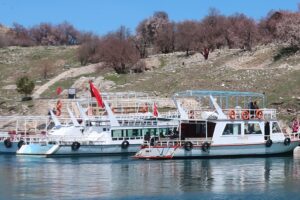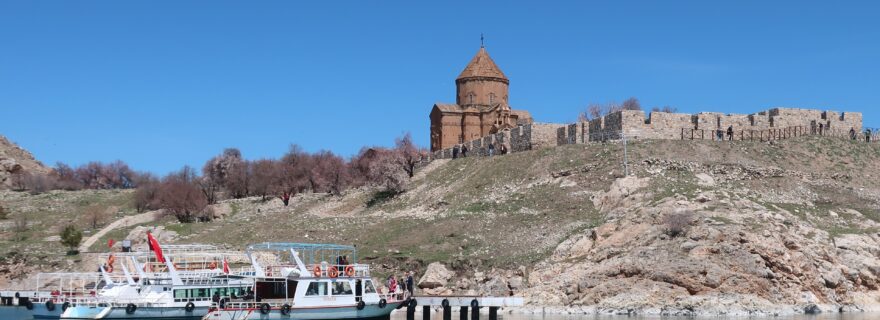Trust in Fieldwork: Lessons from Research in Armenia and Turkey
Ayşenur Korkmaz writes on conducting fieldwork as a practising Muslim in Armenia and Turkey on the afterlives of the Armenian genocide. Whom do we trust, and how can we be trusted?
In his “Behind Many Masks,” Gerald Berreman writes: “Every ethnographer, when he reaches the field, is faced immediately with accounting for himself before the people he proposes to learn to know. Only when this has been accomplished can he proceed to his avowed task of seeking to understand and interpret the way of life of those people.” Brokering access to fieldwork often leaves researchers grappling with issues regarding self-presentation, impression management, and interaction with potential participants. They may find themselves questioned and vetted by respondents about their subject position and motives for research conduct.
Between 2017 and 2019, I conducted ethnographic fieldwork in Armenia and eastern Turkey for my PhD project about the afterlives of the Armenian genocide. My research in Armenia was based on a total of eight months participant observation and interviews with the descendants of Armenian genocide survivors. I often visited the descendants in their homes, where they told me their family stories of flight from the Ottoman Empire. Many also introduced me to an array of objects such as family heirlooms, family trees, or soil, water and stones that were brought from the ancestral towns. My fieldwork in eastern Turkey focused on ancestral tourism and followed the cross-border bus trips that descendants undertook from Armenia in quest of their ancestral past. I participated in tours to Kars, Muş, Bitlis, Ani, Doğubeyazıt, and Van, where we visited Armenian churches, battlefields, graveyards, and the ancestral homes of some tour participants. In both fieldwork settings, my subject position across multiple lines of difference, such as nationality, religion, generation, and politics, was a crucial point to consider. My interlocutors wondered whether I was a Turk or an Armenian. Where was I from “by roots”? Was I Muslim? Why did I wear a headscarf? Why did I learn Armenian? Why should they trust me with their family stories?
In this blog I reflect on the implications of researcher identity and developing trust in ethnographic encounters with the descendants of genocide survivors from Armenia. I was born in Istanbul to a Turkish mother and an Iraqi Turkmen father. I grew up in a predominantly Turkish-speaking cultural environment and have been a practising Muslim. I wear the headscarf by choice and I learned Armenian specifically for my doctoral research. Throughout my fieldwork, my perceived identity, outlook, and interest in the Armenian genocide history were considered confusing and contradictory by my interlocutors. Many simply did not believe that I had a genuine scholarly interest in their family stories. They had their own explanations. Some suspected that I was an Armenian who concealed her true ethnic “identity.” They would ask if I was a “hidden Armenian” (Tsptyal Hay) with Islamized Armenian ancestors. Some were so eager to believe that I was one of them that they gave me an Armenian name they thought would suit me. In some households, I became Ashkhen; in others, Anush or Ani. I was also often taken for a Turkish spy (shpyon) in fieldwork. Some interlocutors would ask if I was working for the Turkish intelligence or the pro-Kurdish political party in Turkey, the PKK.
This haziness about my subject position led me to consider the obstacles to establishing rapport in a post-conflict research encounter to which my interlocutors and I had indisputably become parties. When it comes to developing full trust with prospective interlocutors, particularly in the aftermath of an armed conflict, ethnic cleansing, or genocide, the researcher’s identity—perceived or real—matters significantly. Drawing on fieldwork experience in post-genocide trials in Rwanda, Anuradha Chakravarty coins the term “partial trust” when unpacking the relations between the researcher and the researched. She claims that complete trust may never develop between the two in societies that are affected by conflict or dominated by repression, paranoia, and rumor.


In my fieldwork, this was very much the case. The societal suspicion directed toward Turks in Armenia, generated by the longstanding effects of the 1915–16 genocide and the Turkish state’s decades-old denial of it, posed obstacles to my attempts at cultivating trustful relationships. For example, when I tried to negotiate access to the ancestral tours in eastern Turkey without relying on my existing networks, the travel operators often asked me to prove that I was not a spy working for the Turkish government. I had to explain that I recognized the genocide, where and why I had learned Armenian, and my motivation for investigating the ventures to eastern Turkey. Even when interlocutors gave me research access to the tours or family histories, some relationships always remained in the gray zone between trust and distrust. At one moment, a trustful contact or relationship I had with someone could turn sour because I asked about a sensitive topic or because of a rumor going around in the neighborhood or village where I was conducting research.
Over the years, I could eventually get over these issues and build rapport with my interlocutors. But certainly there were many failed attempts and partially trusting relationships with which I had to work throughout the fieldwork.



0 Comments